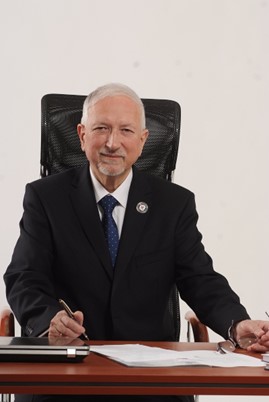Candidacy statement for the position of Vice President for Europe by Zdzisław Wąsik (first mandate as bureau member)

Zdzisław Wąsik (born 1947) is a Polish linguist and semiotician specializing in metascientific epistemology, mundane phenomenology, and philosophy of cosmology. He has publicized his own 7 books and 143 articles, and (co)edited 35 collective monographs. Out of his scholarly output, representative are his two books Epistemological Perspectives on Linguistic Semiotics (2003), From Grammar to Discourse: Towards a Solipsistic Paradigm of Semiotics (2016), 1 article “From Signs of Language and Culture to Semioses of Life: Appreciating Tom Sebeok’s Role in the Building of Global Semiotics” (2021), and 2 chapters “Natural and Cultural Layers in the Discursive Becoming of Language as a Semiotic System” (2023), “Umwelt, Lebenswelt, Dasein & monde vécu – (De)Constructing the Semiotic Cosmology of Human Existentiality” (2023). Among his 171 conference papers, 137 were delivered at the international forum, particularly in the USA, Yugoslavia (Kosovo), Brazil, Norway, the Netherlands, Bulgaria, Germany, Italy, Finland, Sweden, Slovenia, and Belgium. As a regular participant and later a member of the Executive Committee, he participated in 8 world congresses of the International Association for Semiotic Studies. Moreover, he contributed to the works of 11 summer schools organized by the International Semiotics Institute at Imatra. Parallelly, as a Semiotic Society of America member, he presented his papers at its 4 annual meetings. He also delivered a plenary address at the 8th Latin American Congress of Semiotics. Against the background 20 of (co)organized workshops, panels, and symposia, worth mentioning are the last ones, the Ecosemiotic Paradigm for Nature & Culture, Eco-Communicology & Worldview Crisis, and this year, Ecophenomenology & Complex Systems Adaptation. The latter should be an accompanying event of the 16th World Congress of Semiotics where Zdzisław Wąsik fulfills the role of a Chief Coordinator of the Scientific Committee and the Program Committee, to which he has been invited by IASS authorities as a Keynote Speaker. In recognition of his engagement at the scientific and organizational levels, he was elected Fellow of the International Communicology Institute (ICI) in Washington, DC, USA (2005), and subsequently nominated a member of the ICI Bureau and Director of the Regional Coordinators for Europe (2009). The confirmation of his leadership role in the activities of professional and social associations as well as outstanding research productivity was the nomination to the fifth ICI Laureate Fellow (2018).
Manifesto of Future Involvement in the Activity of the IASS
As an honorary member of the Semiotic Society of Finland and a foreign member of the Romanian Society of Semiotics, Zdzisław Wąsik has been endowed with hereditary riches and values of Intermariium regions reaching from the Baltic to the Black See. Since this endowment is based on the legacy of Greeks and Romans, he reinforces the argument that the said Intermariium should be extended to the Mediterranean Sea. It is especially essential as the oldest centers of science and education, based on Latin civilization, were developed in the South, West, and Middle of Europe.
Therefore, Zdzisław Wąsik sees his duty as a representative in the IASS in propagating the main epistemic paradigms and investigative returns of European scholars, and schools of thought engaged in educational, publishing, and organizational activities.
To advocate the sharing of communitarian achievements in theory and practice and bringing traditions together with innovations from modernity to postmodernity, he agrees with a postulate on the extension of boundaries of semiotic studies to the fields of communication, culture, and nature.
In support of the aforementioned conjectures, the candidate for vice-presidency argues that semiotics, in a global sense, shall provide a platform for various approaches that recognize the equality of different conceptual and methodological frameworks.
Finally, he stipulates that fostering cooperation between Europe and other continents concerning the realization of common enterprises ought to proceed on either a bilateral or multilateral basis.

Leave a Reply
You must be logged in to post a comment.